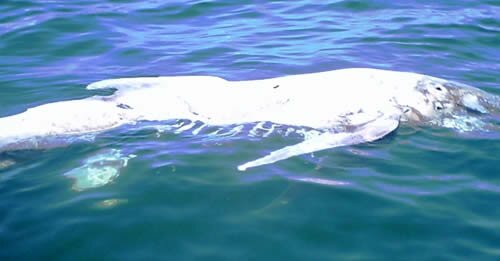[ Return ]
Pilot whale find a reminder of the power of these creatures
December 23rd, 2011
By Ian Miller
On a calm November Friday morning Colin Morris and his crew of Mick Cammish, Murray Hyde and I were returning from one of their typically unsuccessful fishing trips when they came across the remains of a Pilot Whale floating just a few kilometres off Motueka. (Photo below.)

I remember Pilot Whales, also known as a Black Fish, being around Golden Bay when I was a kid on holiday and camping at Pohara Beach in 1961. That was the holiday when I saw a wooden speed boat with an 80 hp outboard motor. I think it might have been my first close up sighting of a fizz boat as I was then a country boy living in a boatless world.
At Pohara I can remember all the men and boys being agog over the power of this incredibly huge outboard engine. The boat came into the beach and I was lucky enough to get a brief but amazing joy ride in it. But to get back to the dead whale
I remember seeing these large creatures on the surface in small pods and remember the adults talking about the 'Black Fish'. I don't recall anybody saying they were whales and I wonder if anybody then knew. They were spoken about as though they were mysterious sea creatures and I was rather awed at the thought of sea monsters out in the bay.
The unfortunate Pilot Whale we found appears to have died because his tail was wrapped in a long line. It's my guess he got tangled and drowned. I guess the fisherman who found him caught in his line just cut the corpse free to drift. What else could he have done - tried mouth to mouth? Or taken it home to put in the compost bin? I guess he should have told DOC about it but maybe that would just cause him trouble so perhaps he just cut the line and kept quiet as I never read anything about this dead whale in the local papers.
A decent size shark was feeding off the carcass when we arrived and the whale was reduced to about a 6m long ghoulish lump of blubber with ribs protruding. Not a sight for the squeamish but very interesting.
Pilot whales are about the largest of the dolphins with only killer whales bigger. There are a couple of species of Pilot whales but it is apparently pretty difficult to tell the difference unless you have their skulls to compare.
These whales roam almost everywhere in both warm and cold waters, feeding on squid and occasionally fish. They are very social living in extended families with both sexes of babies staying with the family pod which is not usually the case for mammals. Interestingly, the females have menopause as their reproductive viability declines, leaving the breeding to the young whale gals.
Different pods seem to get together at times, probably to hunt as a large team and to provide opportunity for mating outside the family group.
The female Pilot Whales tend to live longer than the males and a big female may live to 60 but the blokes only seem to make it to around 45. One could assume that there must be quite a few widows in each pod.
However when it comes to size the males typically grow about a metre longer than the females. In the long fin species the males will reach 6.5m and weigh up to 2,300kg whereas the females seldom weigh more than 1,300kgs. The short fin Pilot Whale males can grow to 7.2m long and weight around 3,200kg.
When hunting these whales are deep divers and at night will hunt down to 600 meters for over ten minutes. During the day they seldom dive deeper than 60 meters.
Note: Sperm whales can dive to 3000m, stay down for up to 90 minutes and have reputedly grown to a massive 26m long. Usually, however, sperm whales only grow to a mere 20.5 meters long and weigh no more than 57,000 kilograms. (The Nantucket Whaling Museum has a 5.5 meter long jawbone on display.)
Pilot whales are very energetic hunters and can make fast attacks to catch squid which is opposite to what would be expected as deep diving mammals usually move circumspectly to conserve energy and oxygen.
As a species, Pilot Whales seem to be particularly good at stranding themselves in shallow water and are probably the most common whales found stuck on our beaches. Why they do this is not understood and indeed it is hardly a good survival attribute. One wonders why their generations of stranding experiences have not taught them to stay well away from shallow and areas with fast moving tides. They might be big but they don't seem that bright.
>> , to be added to the page. [If this link doesn't work, use this form instead]
[ Return ]